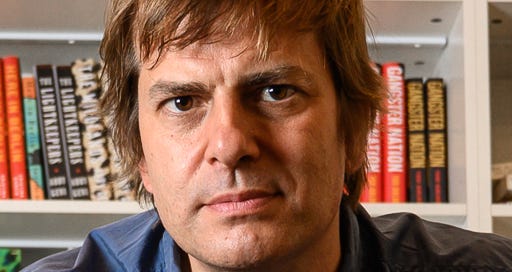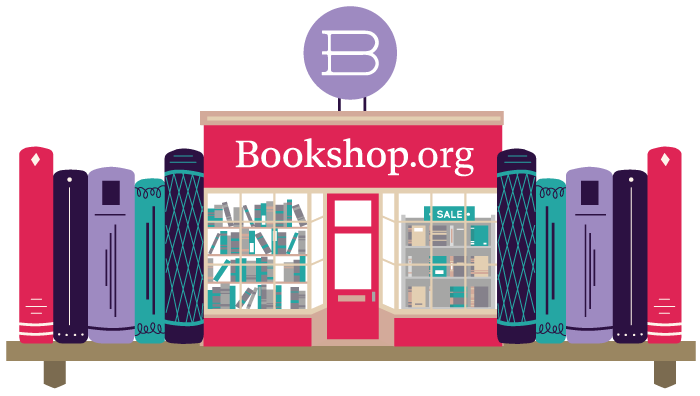Five Questions with Bookshop.org Founder Andy Hunter
He takes us behind the scenes on the website’s launch — and its future
I recently told my friend Emilie that book people are the best people — and Andy Hunter is a Book Person.
He’s the founder and CEO of Bookshop.org, an e-commerce site where readers can order books online while supporting independent bookstores. He helped to launch beloved book websites Electric Literature and Lit Hub and served as the publisher of Catapult.
This is all to say that when I had the chance to interview Andy, I jumped at it. After talking with him, I’m so happy books and bookstores have such a thoughtful, passionate advocate. Our conversation has been edited and condensed for clarity.
From what I’ve read, it was a long haul for you to convince people that Bookshop was a viable idea. How did you persist?
I guess it’s some kind of stubborn doggedness. Even back ages ago when I started my first company, Electric Literature, which started in 2009, there was a time where we weren’t getting any traction and were going to run out of money. I told the staff, “The moment you give up is the moment you fail. If you haven’t given up, there’s a chance you will turn it around.” I thought about that a lot while trying to raise money for Bookshop.
I waited a long time for something to come along that would counteract Amazon and help support independent local business. Then I realized, I should try because it seemed like no one else was going to. It’s kind of like taking a shot at the Death Star — you’re probably not going to win, but if you don’t try, you definitely won’t win.
In the beginning, it was discouraging. People kept telling me that all Americans care about is low prices and fast delivery. Eventually I just ended up connecting with enough people who cared about independent books stores and people who understood that to ensure a good future for books and authors, we need a diverse ecosystem. We can’t afford to let independent bookstores disappear.
I cobbled together a group of seven investors and they came in for an average of $100,000 each, so we ended up raising less than a million dollars. It seems like a lot of money, but it’s not when you’re trying to compete with Amazon. But once we raised $700K, it was just like ‘let’s build it and get going.’ We built it around seven months.
You launched on January 28, 2020. Tell me about those early days.
When we launched, we didn’t have much money left in the bank. We could have survived maybe six or seven months. I don’t know what would have happened it the pandemic hadn’t happened.
The first six weeks before the pandemic we were nervous, we were trying to build interest in what we were doing. We were selling $2,000 worth of books a day, which we considered a success, and trying to line up partners.
Suddenly around the middle of March, we started seeing the numbers going up like crazy. On one day at the end of March, we sold as many books as we did in the entire month of February. The next day, we sold twice as many and the third, the day after that, we sold over $100,000 worth of books, which was about three times what we had sold in February, and then it just grew from there.
It was like building an airplane when you’re flying in midair. We had to build a customer service team. We had to put together the infrastructure to be able to serve all these customers and all these book orders. All while we were growing phenomenally fast.
It was an extremely stressful time, but it was also really, really rewarding and positive to be able to help people at a time when everybody needed help and, like everybody, I felt a little bit lost and helpless.
How does Bookshop stay open while sending funds to independent bookstores?
We’re a B-Corp, so profits are not our goal. Our goal is to keep bookstores alive and healthy.
There are three different ways somebody can buy a book on Bookshop. First, they can buy a book through an individual bookstore’s store on the site, which is about half of our orders. With these orders, we send 30% of the cover price — the profit margin — straight to the bookstore.
Second, we have affiliates [ed note: I’m a Bookshop affiliate], including The Atlantic, Buzzfeed and New York Times. When an affiliate sells a book, we take that 30% profit margin and split it three ways. Ten percent goes to Bookshop to keep the platform going. Ten percent goes to an earnings pool that is distributed to independent bookstores every six months. And, ten percent goes to the affiliate.
Finally, there are some people who go through Bookshop.org because they heard about us on the radio, or come to us through Google or whatever. In those cases, ten percent goes to the earnings pool and 20% goes to supporting the platform.
So, through direct sales and affiliate sales, we make just enough money to support the platform and keep it going, which allows the books stores to get the full profit from orders they create.
What’s next for Bookshop?
We’re going to be launching an e-book platform, an app for Android, iPhone and a web reader.
We want to be able to match what Amazon has to offer on Bookshop. So, Amazon sells e-books through Kindle, that’s a big part of their business, and independent bookstores are completely shut out of that.
We want to create an indie version of that where we support self-published authors, where we can have a more democratic e-book world. I think e-books are in a walled garden. We want to break down that wall. We want to open up a new revenue stream for independent bookstores, so that they can sell e-books and that people who read e-books can support their local bookstore when they buy them. Right now, there's really no option for them to do that.
You’ve worn a lot of hats in the publishing industry. What do you make of the moment we’re in?
It’s a really interesting moment because in some ways the book industry is getting more hit driven and top heavy than ever. There used to be a huge mid-list of authors who would sell anywhere from 5,000 to 40,000 copies of books that had their own fan bases. They were the bread-and-butter of publishing.
Now, more than ever, there’s a few authors that sell tons of books and there’s a lot less of a mid-list. Most of those authors are getting all the attention and all the sales. It’s generally not great unless you’re one of those authors because it’s not great for a diverse ecosystem. It’s making publishers double down on hits and maybe provide less support for other books. The internet intensifies that because certain authors get talked about so much, they really dominate the conversation and then they get the most sales.
On the other hand, what I think is positive is that same technology creates a lot of opportunity for reaching more people. Things like Substack are a great way for authors to build organic fan bases and build their own futures. Kickstarter publishing is another example. You can see authors who have ideas and projects get huge grassroots support. BookTok is another example.
I think the more things head in a corporate, homogenized direction, the more of a counterculture and subculture pop up. That could take us in a different and more positive direction.
We’re in a yin-and-yang period right now where corporate publishing is going one way but there are all of these new interesting things, including Bookshop.org, that are leading us into a more diverse and interesting world of storytelling, ideas, books and writers.
Finally, any books you want to recommend?
For a science and culture person, I recommend The Maniac by Benjamin Labatut. It comes out in the fall, but I’m reading it now and it’s so good. It’s a mind-blowing investigation into humanity’s quest of knowledge and understanding things like quantum physics and math in a way that kind of rips away the veil between our reality. It’s really interesting stuff.
Another one is Little Rabbit by Alyssa Songsiridej. It was a finalist for the First Novel Prize and is about sex, power and making art. It’s a little steamy, really good and super gripping.
And A Living Remedy by Nicole Chung, who is an amazing, super thoughtful writer. In A Living Remedy, she investigates growing up in a small town and then when you move out and become your own self, how that changes your relationship with where you came from. It also changed her relationship with her adopted parents when they started to get older. It’s grappling with the mortality of your parents in a really profound, interesting, meaningful way.
Thanks to Andy for chatting. You can follow him on Twitter and, of course, order books from Bookshop.org.
What to Read If is a free weekly book recommendation newsletter. Need a rec? Want to gush about a book? Reply to this email, leave a comment or find me on Twitter @elizabethheld.
If you’re reading this on Substack or were forwarded this email, and you’d like to subscribe, click the button below.
Disclosure: I am an affiliate of Bookshop.org and I will earn a commission if you click through and make a purchase.






I'm really, really excited Bookshop is moving into ebooks and I just hope they can make sales available to Canada as well as the U.S.
Great interview!
I loved this interview, Elizabeth — awesome job!